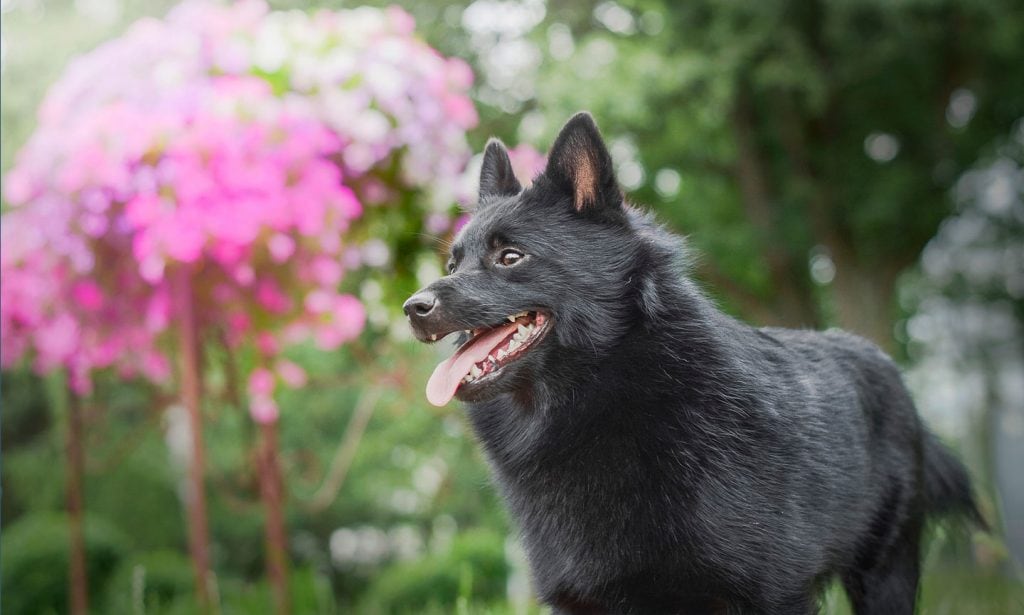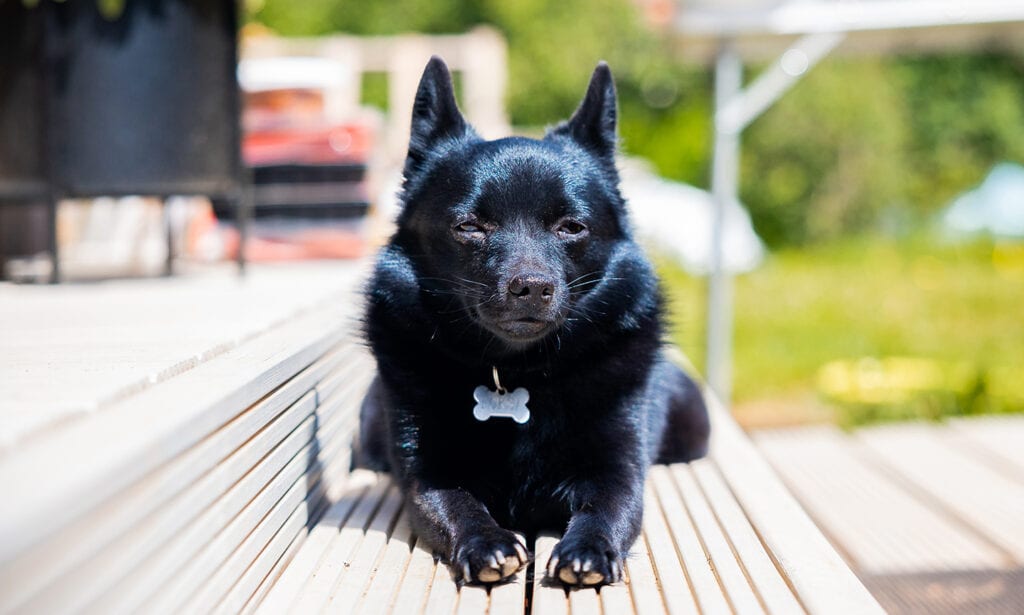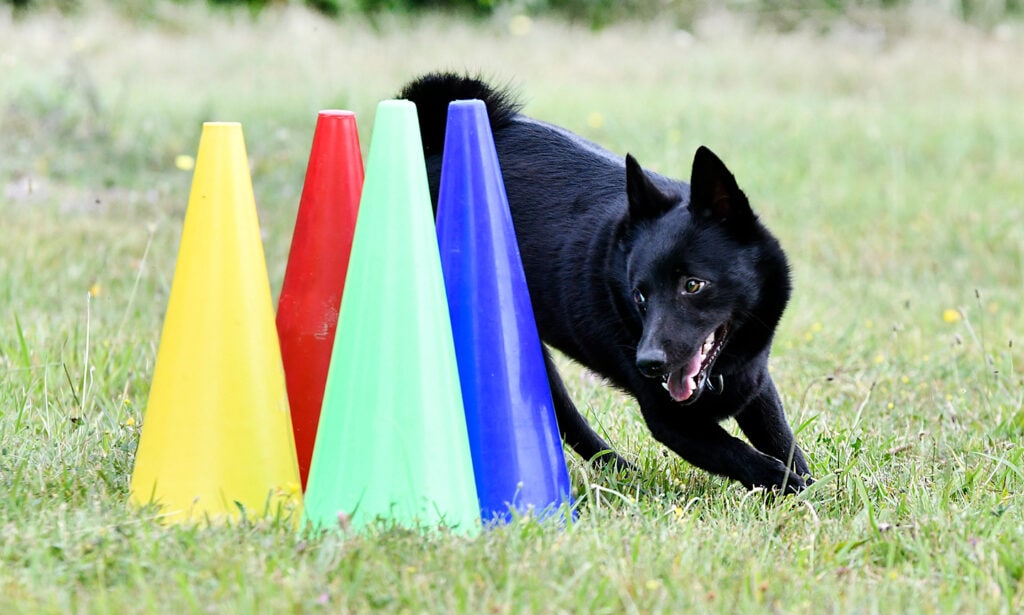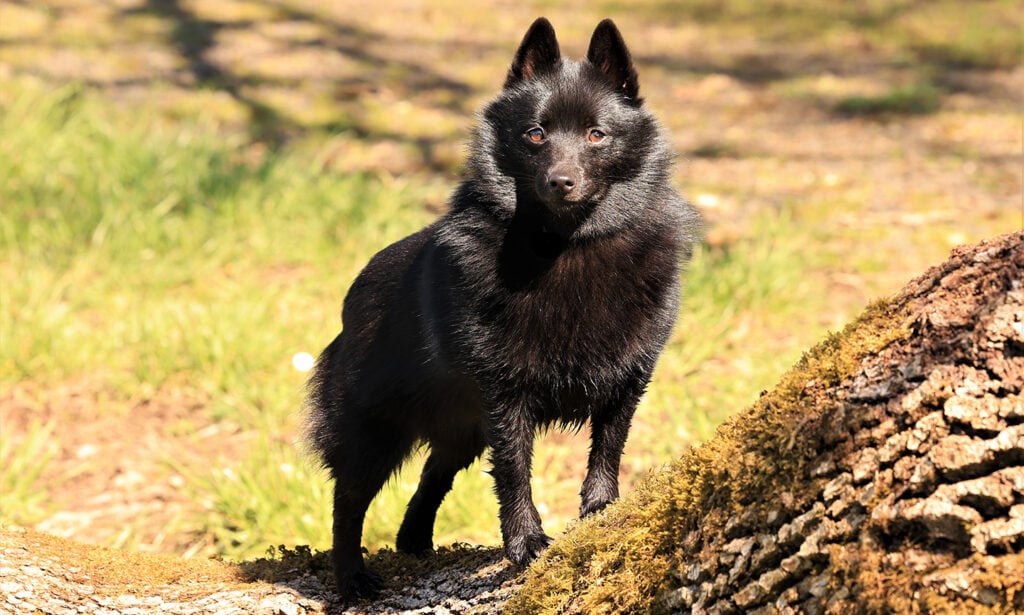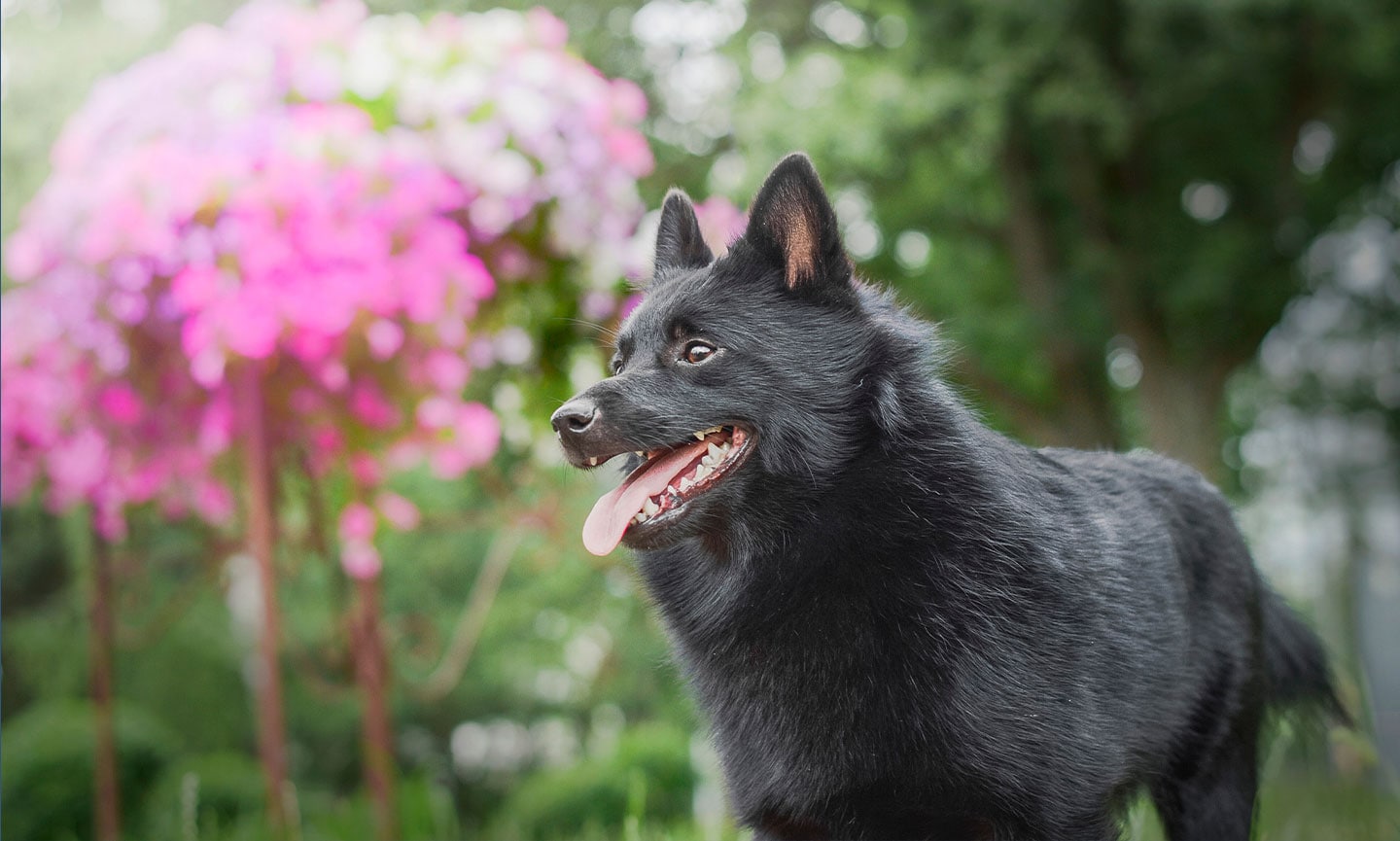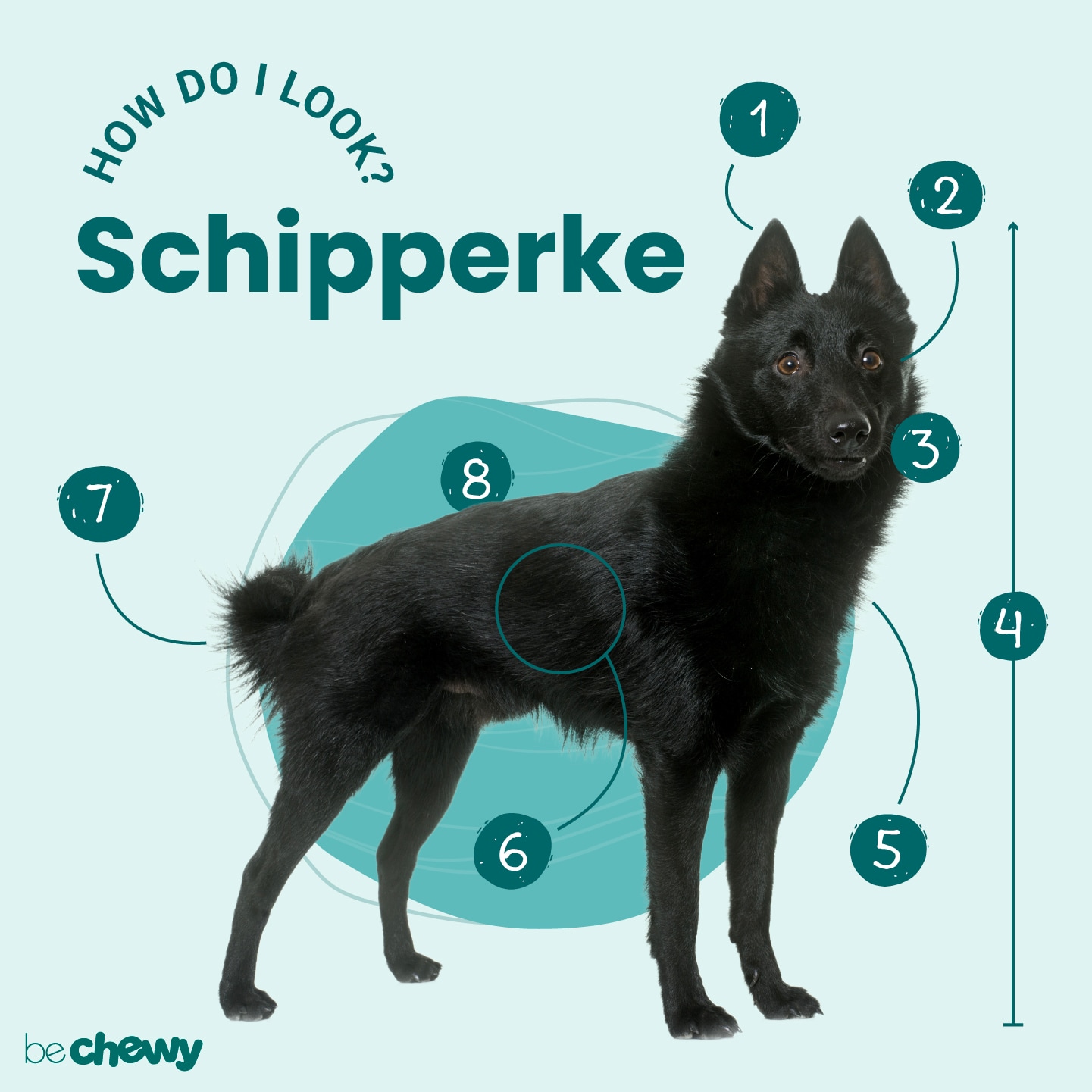Schipperkes are small dogs who believe they’re giant and possess the boisterous demeanor to match. Also called the “little black devil” because their curiosity can land them in trouble, Schipperkes (pronounced “skipper-kee”) are dynamic pups with the heart of a lion—in the body of a fluffy, feisty guard dog. With their take-charge, “I have it covered” nature, Schipperkes will keep you on your toes with their clever ways and high level of intelligence. Looking for the Thelma to your Louise? A lively Schipperke will eagerly join you on all your adventures and be your dearest friend. (And check out that smile!)
Breed Snapshot
Temperament:
CuriousProtectiveVivaciousCoat Color:
Black
Best For
Vivacious and curious, Schipperkes are best in both large homes and small apartments as long as they get mental stimulation, consistent training and daily exercise. They love kids, get along well with cats and other dogs, and thrive as part of a family unit.
Schipperke Temperament
Schipperkes have oodles of personality that will keep you both busy and entertained. Socialize them with other dogs, cats and people. They may be wary of strangers and need to warm up to new faces, but they love and dote on their family members. Their temperament makes Schipperkes an ideal roommate addition if you already have cats, other dogs and kiddos at home—this breed loves them all! The saying “their bark is worse than their bite” definitely applies to a Schipperke: They like to bark to alert their pet parents of noises or passersby, but their small size means they can’t really protect you as a guard dog!
Bred to root out and kill rats and other vermin, Schipperkes are lightning fast, so always keep this curious and agile breed on a leash while exploring the world. Ensure your yard also has a secure fence because these dashing escape artists may decide to fly solo if given the chance. This leads us to the next point: Schipperkes are highly independent and stubborn, so you’ll need to match or outdo their strong persona to raise and train your Schipperke to be obedient yet still full of verve.
How to Care for a Schipperke
Schipperke traits include excessive barking, high energy and behavioral characteristics that warrant training, but caring for this breed physically is a breeze. Their small stature makes them easy to bathe and brush, and they only need a bath once a month unless they get into some mischief! Daily exercise, a healthy diet and obedience training will add up to a happy dog who’ll bring tons of zeal to your home and give your kids a loyal playmate who’s always ready to have fun.
Schipperke Health
Schipperkes have a lifespan of 12–16 years and are generally a healthy breed, but they do have some health issues that you should know about as a pet parent to help your pup live the longest life possible.
- Legg-Calve-Perthes Disease: This genetic, developmental orthopedic disorder of the hip joint leads to lameness and pain. An interrupted supply of blood to the head and neck of the femur bone is the cause. This condition may be found on X-rays when the pet presents with rear leg limping. Treatment may include medications or surgery depending on the severity.
- Luxating Patella: Common in many small breeds, luxating patella is a condition where the kneecap is able to slide in and out of place. Symptoms often include a limp or knee pain. Treatment can include joint supplements, medications and, in severe cases, surgery.
- MPS IIIB (Mucopolysaccharidosis IIIB): This is a rare, fatal genetic disease, and the symptoms are related to the cerebellum part of the brain. The signs include tremors, difficulty balancing and walking and other balance-related issues. There is no cure or successful treatment for this disease, but genetic screening testing is available, so ask your breeder.
- Hypothyroidism: Hypothyroidism is when the body doesn’t make enough thyroid hormone. Symptoms of hypothyroidism include dry skin and coat, hair loss, weight gain and lethargy. Typically diagnosed by a blood test, your veterinarian will likely treat with daily oral medication.
- Cataracts and Progressive Retinal Atrophy: Eye problems that can affect Schipperkes are cataracts and progressive retinal atrophy (PRA), an eye disease that will eventually cause vision loss. Surgery can correct cataracts in some cases. There is no treatment for PRA. However, a dog with vision loss can still live a happy life.
Schipperke History
Schipperkes’ ancient origin dates back to the 1600s and includes a storied history of seafaring escapades. First born in medieval Belgium, the word Schipperke is Flemish for “little captain.” A breakdown of the Schipperke name: Schip is Flemish for boat, and schipper means skipper or boat captain, so schipperke translates to little captain of the boat. (Pretty cool, huh?) Schipperkes earned this nickname with their constant nautical presence, hunting vermin on ships and guarding boats in Belgian dockyards.
This small shepherd originated from a black Belgian sheepdog called a Leauvenaar. These active dogs were bred to work and toiled on boats to root out and kill all the rats. Shopkeepers also relied on Schipperkes to watch over and protect their merchandise.
After the first Schipperke arrived in America in 1888, the American Kennel Club (AKC) recognized the breed in 1904. The AKC Parent Club for this breed, the Schipperke Club of America, was established in 1929. Schipperkes rank 113 out of 200 breeds according to the AKC’s breed popularity ranking system.
A fun Schipperke fact is that they were the companion dog of choice for beloved actress Lucille Ball, who owned many of these feisty little dogs. She named one of her pet Schipperkes Ginger.
Hoping to add a Schipperke to your pack? Find a list of reputable breeders on the AKC website. What’s the average Schipperke price? You can expect to pay $700 to several thousand dollars for a purebred pup. You can also find a Schipperke rescue organization near you, keep a lookout for the breed to be up for adoption at your local animal shelter, or search Chewy’s database of adoptable dogs in your area.
FAQs
Do Schipperkes shed?
Schipperkes shed minimally year-round and have a heavier shedding season once or twice annually (in the spring and fall). Weekly brushing can help.
How long do Schipperkes live?
Schipperkes have a lifespan of 12–16 years.
Are Schipperkes good family dogs?
Yes, Schipperkes are good family dogs. They are great with children and are known to adore kids and play tirelessly with them. Schipperkes’ small size makes them less intimidating to young kids as well.
Do Schipperkes bark a lot?
Schipperkes are prone to excessive barking, especially given their nature as guard dogs and territorial tendencies, making them suspicious of strangers.
What are the most common Schipperke mixes?
- Schipperke-Chihuahua mix (Schipper-Chi)
- Schipperke-Pomeranian mix (Schip-A-Pom or Pomerke)
- Schipperke-Border Collie mix (Border Schipper)
- Schipperke-Corgi mix (Corgi Schip)
- Schipperke-Lab mix (Schipperke Retriever)
Note: These are not purebred dogs but mixed breeds.
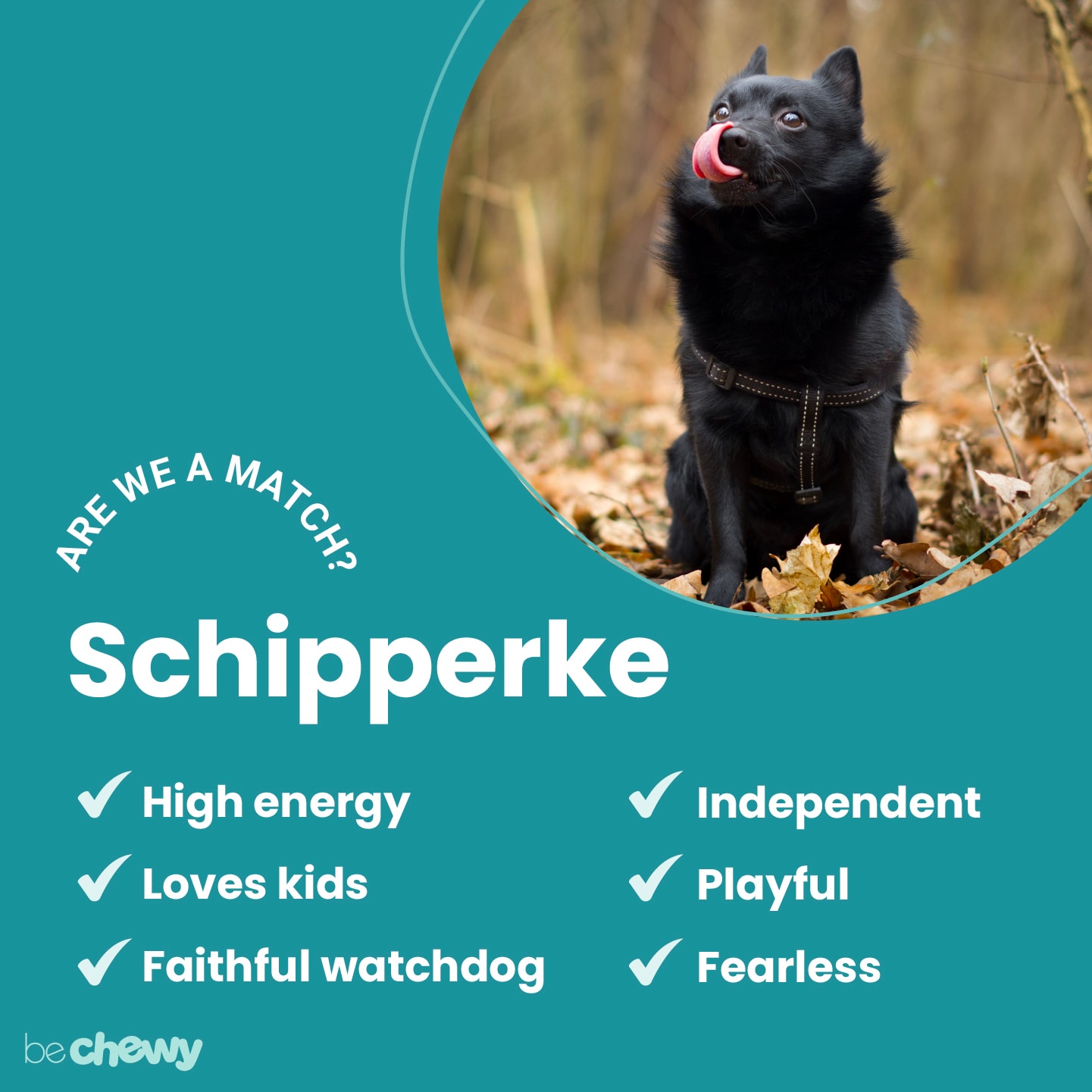
Top Takeaways
The most important Schipperke information you need to know is that you’re getting a supersized personality in a small dog’s body. Schipperkes are high-energy, alert dogs prone to mischief and barking, so they need obedience training from a confident pet parent and daily exercise. In return, they will protect your family with all their heart—they adore kids—and be a playful, loyal companion who adds lots of vibrance to your life. The irresistible sparkle in their eye betrays their spirit of unquenchable wonder.
Expert input provided by Dr. Jerry Klein, Chief Veterinary Officer for the American Kennel Club; Dr. Elizabeth Grey, Veterinarian, President and Hospital Director of Carmel Mountain Ranch Veterinary Hospital, and owner of Dr. Grey’s Play & Stay; Graham Bloem, Certified Dog Trainer & Behavior Expert, Owner & Training Director of Specialty Dog Training; and Dr. Shirley Quillen, Health and Genetics Chair, Schipperke Club of America.
Breed characteristic ratings provided by Dr. Sarah J. Wooten, DVM, CVJ, a veterinarian at Sheep Draw Veterinary Hospital in Greeley, Colorado; dog trainer and behavior consultant Irith Bloom, CPDT-KSA, CBCC-KA, CDBC, owner of The Sophisticated Dog, LLC, in Los Angeles; and certified animal behavior consultant Amy Shojai, CABC, in Sherman, Texas.
The health content was medically reviewed by Chewy vets.

Search for Adoptable Schipperkes Near You
Female Names
- Kona
- Bella
- Maddie
- Evie
- Roxy
- Luna
- Missy
- Raven
- Izzy
- Pippa
Male Names
- Bear
- Onyx Skye Foster
- Milo
- Oreo
- Bandit
- Porter
- Riley
- Skips
- Mick
- Finn
Share:
